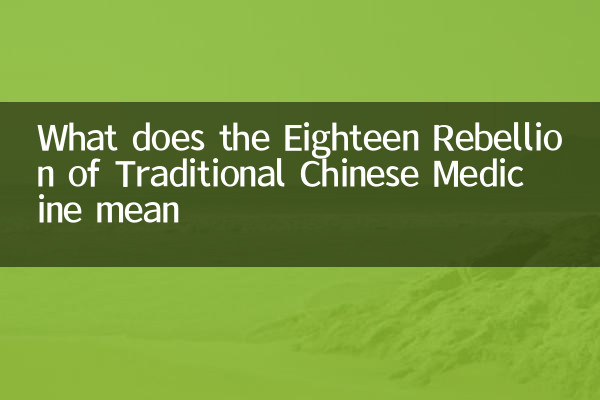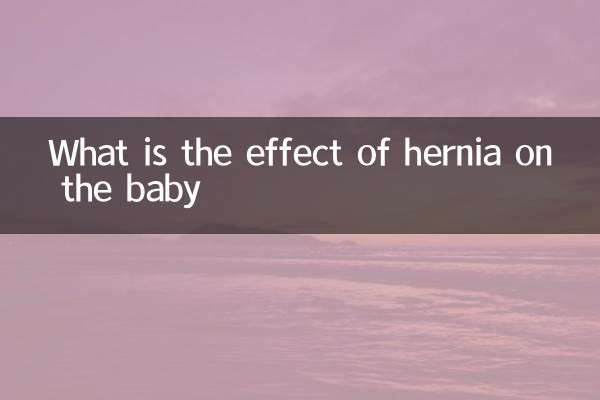What does the Eighteen Rebellion of Traditional Chinese Medicine mean
In recent years, traditional Chinese medicine culture has attracted more and more attention worldwide, especially the concept of "Eighteen Antis" in the taboos of traditional Chinese medicine compatibility, which has become a hot topic for many traditional Chinese medicine enthusiasts and researchers. This article will combine popular topics across the Internet for the past 10 days to explain in detail the meaning, historical background, specific content and modern applications of "Eighteen Anti-Traditional Medicine".
1. Definition of the Eighteen Antis in Traditional Chinese Medicine

The "Eighteen Antis" are one of the core contents of the contraindications for traditional Chinese medicine compatibility. They refer to the fact that certain drugs will be toxic or reduce their efficacy when used in combination, and may even endanger life. This concept originated from ancient Chinese medicine classics and is an important guiding principle for the clinical use of traditional Chinese medicine.
2. The historical origins of the Eighteen Antis
The Eighteen Rebellions can be traced back to Zhang Zhongjing's "Jinkui Yaolue" by the Han Dynasty, and were further elaborated and improved by classic medical books such as Sun Simiao's "Qianjin Yaofang" by the Tang Dynasty and Li Shizhen's "Compendium of Materia Medica" by Li Shizhen in the Ming Dynasty. The following is a brief introduction to the ancient books related to the Eighteen Antis:
| Ancient book name | author | dynasty | Related content |
|---|---|---|---|
| "Golden Chamber" | Zhang Zhongjing | Han Dynasty | The first theory of drug malignancy |
| "A thousand gold must-have" | Sun Simiao | Tang Dynasty | Contraindications for systematizing drug compatibility |
| Compendium of Materia Medica | Li Shizhen | Ming Dynasty | Detailed records of the specific contents of the Eighteen Antis |
The specific content of the Eighteenth Anti-Off
The Eighteen Anti-Eighteen specifically refers to the compatibility taboos between the following Eighteen drugs:
| Classification | The opposite drug | Taboo reasons |
|---|---|---|
| Licorice | Euphorbia, Cyperus, Garlica, Seaweed | Increase toxicity |
| Aconitum | Fritillaria, Trichosanthes kirilowii, Pinellia ternata, White and | Produce severe poison |
| veratrhea | Ginseng, Salvia miltiorrhiza, Salvia miltiorrhiza, Scrophularia, Asarum, Peony | Reduce therapeutic effect |
Modern Research and Dispute on IV and Eighteen Antis
In recent years, scientific research on the Eighteen Antis has gradually increased, and some scholars have discovered through experiments that not all "opposite" combinations will produce toxicity. For example, licorice and seaweed may not produce significant toxicity under certain conditions. This discovery has triggered a rethinking of traditional compatibility taboos in the traditional Chinese medicine community.
The following are the popular topics on the "Eighteen Anti-Traditional Medicine" in the past 10 days:
| topic | Popularity index | Main discussion points |
|---|---|---|
| Eighteen Anti-Science Verification | 85 | The Challenge of Modern Experiment to Traditional Theory |
| Eighteen anti-clinical application cases | 78 | Adverse reactions caused by violation of the Eighteenth Anti-Revolution |
| New explanation of the taboos of traditional Chinese medicine compatibility | 92 | Reinterpretation of traditional theory |
The clinical significance of 5. Eighteen antis
Despite the controversy, the Eighteen Antis still have important clinical guiding significance:
1. Remind your doctor about the risks that may arise from drug compatibility
2. Provide traditional basis for the evaluation of Chinese medicine safety
3. Promote in-depth research on the interaction mechanism of traditional Chinese medicine
6. How to correctly view the eighteen antagonisms
In the context of modern medicine, we should look at the eighteen antagonisms dialectically:
1. Respect traditional experiences, but do not blindly believe in superstitions
2. Understand the companion taboos based on modern research results
3. Use Chinese medicine under the guidance of a professional physician
7. Conclusion
The Eighteen Anti-Traditional Chinese Medicine is a summary of the experience of traditional Chinese medicine practice over thousands of years, reflecting the ancients' high attention to drug safety. With the development of modern technology, we need to re-examine these traditional theories with a scientific attitude, neither completely denying them nor being self-supported. Correct understanding and application of the Eighteen Anti-Japanese War is of great significance to ensuring the safety of traditional Chinese medicine and promoting the modernization of traditional Chinese medicine.

check the details

check the details